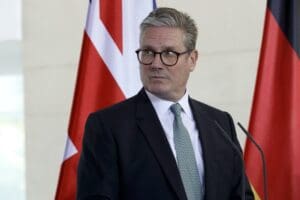Sir Keir Starmer has signalled that Britain will avoid taking sides in the escalating trade row between the United States and the European Union, insisting that it is in the UK’s “vital interests” to stay on good terms with both allies.
Addressing EU leaders at a summit dinner in Brussels, the prime minister attempted to reset the UK’s post-Brexit relationship with the bloc. Yet this diplomatic push was overshadowed by renewed threats from President Trump, who warned of tariffs of up to 10 per cent on EU exports, accusing Europe of an “atrocity” on trade.
Trump’s rhetoric follows his imposition of a 10 per cent tariff on Chinese goods over the weekend, prompting Beijing to retaliate by levying further charges on US products. Meanwhile, Canada and Mexico—original targets of the US president’s trade demands—have both seen threatened tariffs paused as they negotiate concessions. Analysts warn these moves could trigger wider, tit-for-tat measures that disrupt global trade.
Despite mounting pressure, Starmer declined to criticise Trump’s approach directly. He emphasised that the UK’s close economic ties with both the US and the EU make it critical not to antagonise either side. While Starmer acknowledged the strain on global commerce, he said Britain “cannot choose” between its two biggest trading partners and must “act in the national interest”.
Ministers, however, have quietly drawn up possible retaliatory tariffs in case US levies end up hitting British goods. Government sources caution that going toe-to-toe with Trump on trade barriers would do little to contain the fallout, potentially sparking further reprisals from Washington.
Analysts say the UK is “highly exposed” to any disruption in global trade flows. Even if Britain avoids direct tariffs, a drawn-out battle between the US and EU could cool wider economic growth, hurting demand for British exports and fuelling inflation through rising import costs. Industries reliant on cross-border supply chains—from automotive to consumer goods—face heightened uncertainty.
In Brussels, European leaders responded in forceful terms. President Macron of France promised a robust reaction if the EU’s commercial interests are targeted, while German Chancellor Olaf Scholz warned tit-for-tat sanctions would be damaging on both sides of the Atlantic. EU officials also urged unity, suggesting that weakening western ties benefits rival nations such as China and Russia.
Starmer’s attempt to improve trade ties with Europe comes at a precarious time. Downing Street hopes to reduce red tape on food exports—a measure that could yield savings of £3 billion a year—and strengthen cooperation on energy and defence. Yet these efforts risk being overshadowed by mounting global trade tensions, leaving Britain caught between the EU’s defiance and the US president’s unpredictable stance.
European leaders also expressed alarm at Trump’s broader moves, including a proposed US sovereign wealth fund—fuelled by budget deficits rather than surpluses—and his ambiguous interest in Greenland, a Danish territory. Such overtures, EU officials said, added to the uncertainty surrounding the White House’s international ambitions.
For now, the White House has shown a willingness to grant temporary reprieves to countries facing tariffs, as demonstrated by deals with Canada and Mexico. However, the EU may not receive the same leniency. Starmer’s refusal to criticise Trump reflects a careful balancing act, but continued volatility could force the UK to adapt its approach if transatlantic tensions escalate further, potentially undermining the prime minister’s ambitions to bolster post-Brexit commerce.
Read more:
Keir Starmer keeps quiet on Trump’s EU trade threats amid post-brexit reset

